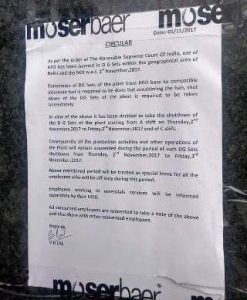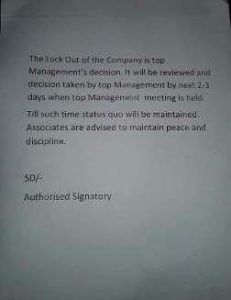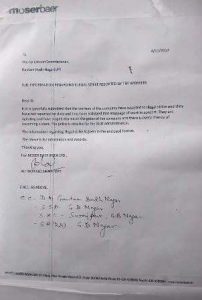Moser Baer India employees await dues and justice; Company denies wrongdoing
Workers of MBIL have filed a writ petition against owners, bankers, management of Rs. 6,596 crore fraud. However, promoter of the company says that there is “no termination” but “discharge under the provisions of law”.
 2,280 workers of Moser Baer India Limited (MBIL), the Greater Noida manufacturing company which was known for its CDs, DVDs and memory devices, are still awaiting their salaries of 16 months after the company was declared defunct on September 20, 2018 by National Companies Law Tribunal (NCLT).
2,280 workers of Moser Baer India Limited (MBIL), the Greater Noida manufacturing company which was known for its CDs, DVDs and memory devices, are still awaiting their salaries of 16 months after the company was declared defunct on September 20, 2018 by National Companies Law Tribunal (NCLT).
Back in 2017, on November 1, as per a circular issued by the company, the plant was to be shut down temporarily till November 3 for conversion of Diesel Generator (DG) sets from Heavy Fuel Oil or HFO to alternative compatible fuel as per the Supreme Court order that banned HFO.
However, the company was on a lock out on November 4 when the workers came back to work. The notice put up by the company read, “The lock out of the company is top Management’s decision” and it will be reviewed in the next 2-3 days when a meeting is held.
Alleging “illegal termination and lock out” of the 114-acre plant by the company which resulted in workers who have spent more than 20 years with the company losing out on their jobs overnight on November 4, 2017, the workers approached a list of authorities seeking “justice”.
These included Gautam Budh Nagar’s District Labour Commissioner (DLC), Uttar Pradesh Chief Minister Yogi Adityanath, Prime Minister’s Office, Gautam Budh Nagar’s MP Mahesh Sharma among others.
Promoter Deepak Puri who set up the company back in 1983, tells Delhi Post in an email interaction that there is “no termination” but “discharge under the provisions of law”.
“The Company was under CIRP (Corporate Insolvency Resolution Process) w.e.f. 14-11-2017 and since no resolution plan came for revival of the company from any Third Party, liquidation was commenced by an Order of the Hon’ble NCLT w.e.f. 20-09-2018. There is no termination by anybody but actually it is a discharge under the provisions of law. Upon Liquidation, all employees and workmen got discharged in accordance with Law with no control of previous management/promoters,” he says.
Moser Baer India in a written email to Delhi Post states, “The discharge for workmen and employees happened only by liquidation order of Hon’ble NCLT in September 2018. There has been no loss of job on November 4, 2017 and the discharge for workmen and employees happened under the provisions of law only on Order of the Hon’ble NCLT for liquidation dated September 20, 2018.”
The company says that “the plant was not running when lockout was declared in response to illegal strike by workmen, and in fact, it had not been working since October 2017 due to shortage of raw materials and had only worked intermittently since June 2017”.
Deepak Puri further says that the company has a credit history of meeting all interest and loan repayments for 30 years and “the decision to take MBIL to NCLT was taken by bankers not by promoters”.
“One of the banker of the company filed an application on 20.09.2017 under Section 7 of the Insolvency and Bankruptcy Code, 2016 (IBC) before the Hon’ble NCLT at New Delhi, for initiation of CIRP of the company,” says Deepak Puri.
Though the UP Labour Department, DLC, Insolvency Resolution Professional (IRP), Allahabad High Court and UP Governor held that the lock out was illegal, no case was filed against MBIL owners, MBIL Management, factory manager for locking a running plant having 2,280 employees, say the workers.
“Question should be asked to DLC, Gautam Budh Nagar as to why he did not initiate any action on this criminal offence in his area,” ask the workers.
The workers also say that they haven’t received their gratuity, Provident Fund (PF) and other compensations while the close associates of the company have received their gratuity in full even after the liquidation process was initiated.
 “The IRP refused to pay gratuity to employees in full but at the same time, gratuity was paid to a total of 141 employees who were close to the top management and company owners. This was done in a planned manner. Also, they have are now given employment in other subsidiaries of MBIL group such as MBEL, MBPV, MBCEL and HPPL. This gratuity was paid before the company went to NCLT, during NCLT period and surprisingly, even after liquidation order by court in September 2018,” allege the workers.
“The IRP refused to pay gratuity to employees in full but at the same time, gratuity was paid to a total of 141 employees who were close to the top management and company owners. This was done in a planned manner. Also, they have are now given employment in other subsidiaries of MBIL group such as MBEL, MBPV, MBCEL and HPPL. This gratuity was paid before the company went to NCLT, during NCLT period and surprisingly, even after liquidation order by court in September 2018,” allege the workers.
Moser Baer India says the gratuity was paid under the provisions of law and to those leaving the company from the Gratuity fund of the company regardless of the seniority or the place of working at head office or at factory. “Due to uncertainty over continuation in employment due to deteriorating financial conditions and NCLT application filed by Financial Creditor under IBC, many employees and workmen had resigned during the period,” they say.
They further state that the claims for workmen will be processed in accordance with IBC where they have a priority along with Secured Lenders. “They are further getting wages and salaries as CIRP costs for the entire CIRP period on a going concern basis which has priority over payments to even Secured Lenders.”
The company on their part termed the agitation as an illegal strike resorted by workers on November 4, 2017 in a letter to the DLC, Gautam Budh Nagar under the provisions of U.P. Industrial Disputes Act.
Meanwhile, the company is also said to have registered a trade union in March 2018 which as per the workers “never existed in the first place” and which has been subsequently denied by the company to Delhi Post stating, “There had been no application by Company for registration of Trade Union and the registration happened when the company was in CIRP under the control and management of RP”.
The workers finally submitted a writ petition to the Supreme Court on December 21, 2018. In the petition, they state that through “misusing the NCLT law, owner Deepak Puri and his family have let the company be declared defunct”.
“We believe, the moment when over 2,000 workers who had worked for over two decades were terminated without notice in November 2017 was the first crime. It was in violation of labour rights,” Satendra Nagar, former Production Manager, Moser Baer India, who is one of the petitioners tells Delhi Post in an exclusive interview.
Interestingly, Deepak Puri is the brother-in-law of Madhya Pradesh Chief Minister Kamal Nath as he is married to Nath’s sister, Neeta Puri. During UPA 1 and 2, using Nath’s influence, the petition alleges that Rs. 6,596 crores was given as loan through multiple banks. The petition asks that like Amrapali, Jaypee and Sahara, Moser Baer India’s owners, management and Indian banks associated with the fraud “should be penalised”.
Also read: PNB Scam: A Corporate Governance Failure
When the banks started stressing on recovery in 2012, “the entire family moved their son, Ratul Puri from MBIL to Moser Baer’s profit-making company ‘Moser Baer Power Project’ which was renamed as ‘Hindustan Power Project Pvt Limited’ (HPPPL)”. This was done to forgo off the bank loans on MBIL and to save HPPL from repayment of the loans taken from several banks.
However, Deepak Puri states, “These are baseless allegations by workmen”.
“Ratul Puri started HPPPL way back in 2007-2008 totally independently and always wanted to pursue his own business in areas other than technology”.
He adds, “Thus, as part of a family settlement, (he) resigned from MBIL and transferred all the shareholding. I continued in the management of MBIL till CIRP was initiated by bankers.”
The company clarifies that “HPPPL is a totally independent funded company managed and run by its own management. It has no link whatsoever with Moser Baer as a company. We cannot comment on the funding of HPPPL, but from public records it appears it is funded by a large private equity investors and bankers”.
The petition further alleges that from 2012 to 2017, the entire family along with banks kept restructuring the loans until by using NCLT’s law, the company was declared bankrupt.
“We initially thought that this was done to dispose of the liabilities when the funds started reducing but through the company audits, we workers, came to know that the entire proceeding was planned since 2009 when the UPA was in power. They had been taking loans and restructuring them as they understood that the business of CDs, DVDs was slowly phasing out,” states Nagar, who had been with Moser Baer for 16 years.
The company agrees that as the technology was transitioning from from CDs/DVDs to Solid State Media and then from storage media to storage on cloud, there was a decline in business along with “inflexibility in reduction of manpower under current labour laws despite reduction in business”. According to the company, the downfall of Moser Baer India was also compounded by factors such as “collective push by workmen for increase in wages and salaries when business was in losses, non-support by bankers as per CDR terms and recession in international markets from 2008 to 2010”.
The company maintains that the company was “considerably crippled” when the workmen went on illegal strike for 35 days in 2015 for increase in wages and salaries. The company states that it further increased the salary burden for subsequent months/years. “The company lost orders of Optical Media to competition due to 35 days of strike which dented the company’s high reputation and future business,” they say.
However, referring to the company’s eligibility for CDR (Corporate Debt Restructuring) Mechanism under RBI Guidelines, Moser Baer India says, “the loan of the company was restructured as the company was eligible and the same (was) done through CDR mechanism as it was in the interests of all stakeholders for which all due process was followed and a Master Restructuring Agreement was signed.”
The workers further say that since the average age of workers is in the 40-50 years range, they “haven’t been able to get decent jobs” and have been “doing odd jobs” while several others remain unemployed.
The petitioners say that while six have lost their lives because of brain stroke, heart attack and stress, two workers are mentally affected after the incident.
During the CIRP (Corporate Insolvency Resolution Process) period where an insolvency professional exercises the powers of the Board of Directors and manages the operations of the corporate, the family through their influence, is reportedly said to have not let any investor revive the company. But the company, in turn, states that “One of the reasons why prospective investor or resolution applicants had not come forward was due to the protests and agitation by workmen, which has led to fear in minds of prospective resolution applicants, and no plan came forward despite initial interest shown by few”. “The level of protests was so high that the workmen had even ‘gheraoed’ the management including women working at Administrative block of factory on October 26, 2017 and allowed them to go home at 4.00 am of the next day after intervention of administrative and labour authorities,” pointed out the company.
“It is important to note that their continued protests and disturbance at factory gates may also delay liquidation process and resultant payouts to these workmen,” they further state.
 Though Finance Minister Arun Jaitley recently stated in a blog post that the Insolvency and Bankruptcy Code (IBC), 2016 has proved to be “extremely successful” when it comes to its effectiveness in resolving high ratio of Non Performing Assets or NPAs on the books of the banks within the country, the petitioners point out that employees of the liquidated company either don’t receive their dues in time or even if they do, they receive it in reduced shares.
Though Finance Minister Arun Jaitley recently stated in a blog post that the Insolvency and Bankruptcy Code (IBC), 2016 has proved to be “extremely successful” when it comes to its effectiveness in resolving high ratio of Non Performing Assets or NPAs on the books of the banks within the country, the petitioners point out that employees of the liquidated company either don’t receive their dues in time or even if they do, they receive it in reduced shares.
The petitioners state that “The IRP rejected most of the employees’ claims which are related to employees’ livelihood and future” such as compensations/VRS. “Most of claims which are accepted by the IRP are admits in “Other dues of Insolvency and Bankruptcy Board of India (IBBI)” which are subjected to be paid on pari-pasu ration of banks which means that nothing will come in employees hand i.e. for a claim of five lakhs, only 35K will be paid,” said one of the petitioners.
However, stressing on his inability to comment on the petition, liquidator Anil Kohli told Delhi Post, “The liquidation proceedings are being conducted and verified. Soon, auction notice for sale of assets of company will be published. Workers have approached Supreme Court but the petition has not been served on me. Therefore, I am not in a position to comment.”
The workers say that unlike Vijay Mallya and Nirav Modi who have fled the country, the Puri family is still in the country and needs to be “brought to book”.
So what do they plan to do next? “We have been asked by our lawyer to get the authority letter with 2,000 signatures for the next phase of the petition proceedings. It seems to be a long battle, but one that is must for workers like us who have lost out on their livelihoods and happiness in a jiffy,” mentioned one of the petitioners, alleging that it seems, “the Puri family is trying to buyback the factory through Kamal Nath’s sons who are in the business line”.
Denying the allegations of buyback, the company tells Delhi Post that “the workers were aware of the financial difficulties faced by the company and nothing happened in a jiffy”. “It is vehemently denied that Puri family is trying to buyback factory. The Liquidator is in charge and he has initiated the process of liquidation under IBC and continued protests by workmen could lead to further delay in sale of assets and payouts to these workmen. The promoters are neither allowed nor it is within their means for any buyback of the factory,” state the company.
